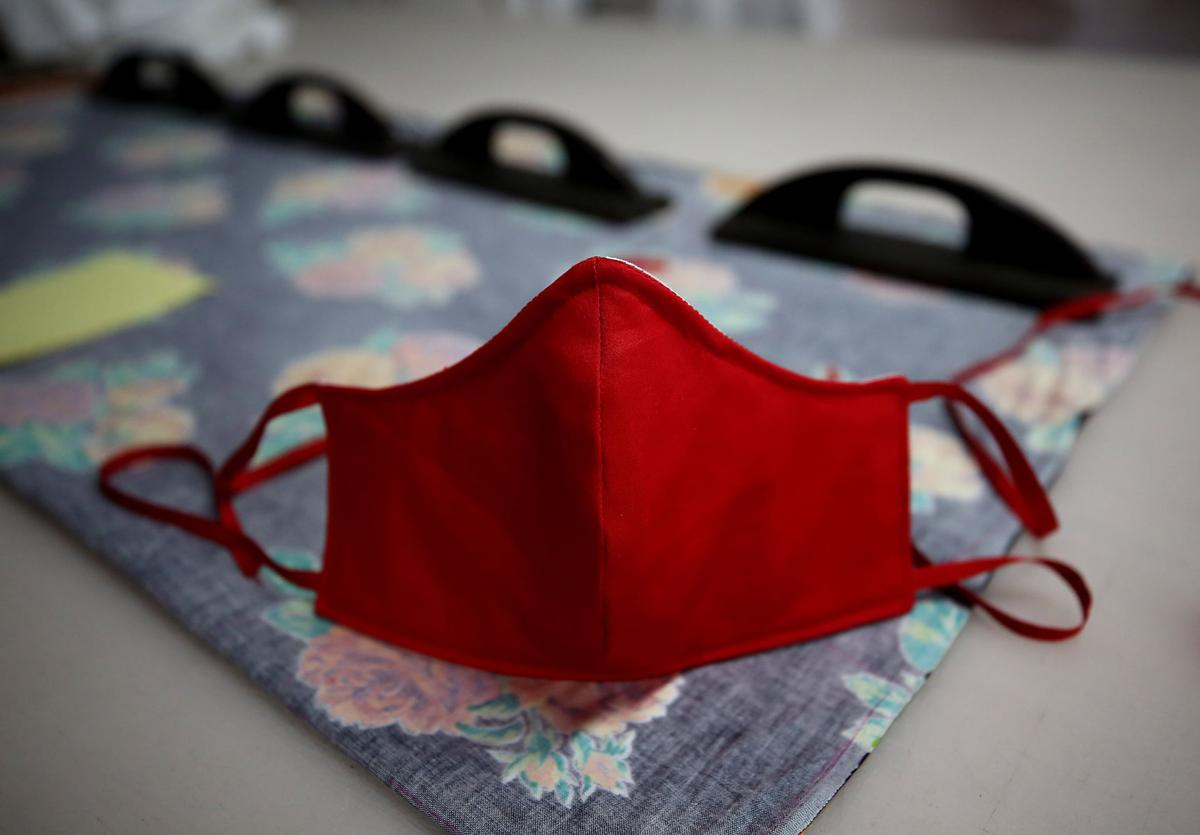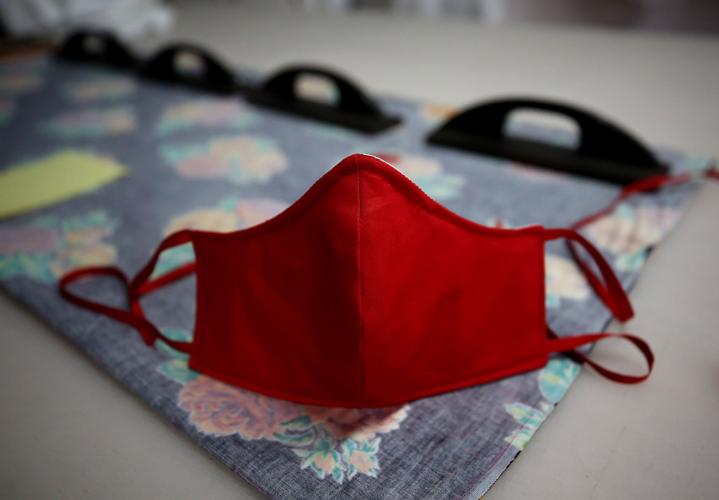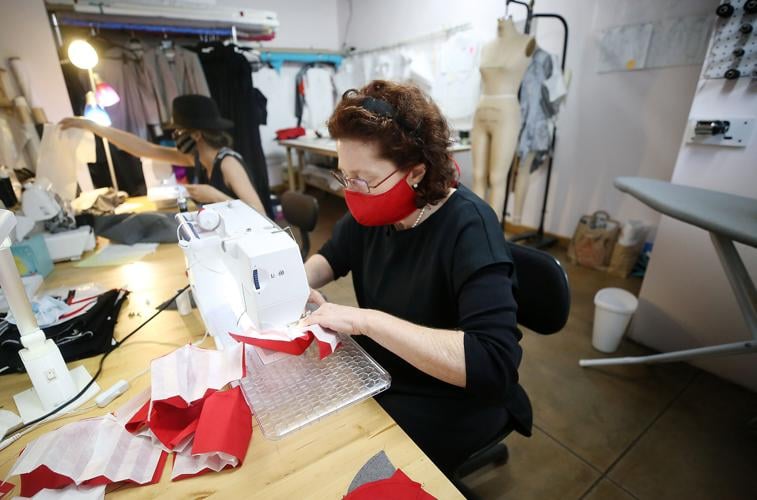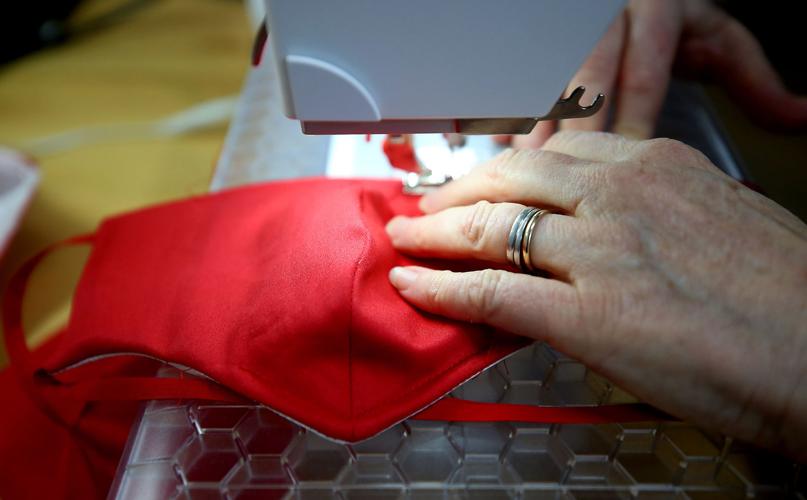Editor's note: This story was updated on June 10, 2020.
Your social distancing uniform of T-shirts and sweat pants has a new accessory: Cloth face masks.
Last week, the Centers for Disease Control and Prevention recommended that the public begin wearing cloth face masks in public settings as COVID-19 continues to spread.
The recommendation is primarily to keep people who have the virus but don't have symptoms from spreading it, not as a way to protect the mask wearer. These are not medical-grade masks. Staying home and staying 6 feet away from people is still the best way to slow the spread of the virus.
People are also reading…
Also, it's important that we should all use cloth masks instead of surgical masks or N95 respirators. Those are desperately needed by our healthcare professionals.
So how do you get a cloth face mask in Tucson? You have a few local options.

Laura Tanzer is making masks out of her downtown Tucson studio.
Make it
For those who can, this is the best option. The CDC has some basic hand-sewn and no-sew patterns using materials you're likely to already have lying around the house.
Volunteers with the University of Arizona College of Nursing have also created a step-by-step guide to sewing your own mask.
Yvette Mathesen, a nurse and coordinator of the college's Steele Innovative Learning Center, worked with her colleagues and fellow nurses Paige Bravo and Terry Bailey and several quilters — her mother Yvonne Flores and Diane Arnold — to create a mask pattern that worked for both the nurses and the quilters.
Mathesen says they wanted to create a mask that was based on evidence, that mimicked the properties of real masks, that was easy to make with materials found at home and that could be reused and easily cleaned.
The pattern they came up with uses 100 percent cotton cloth (a high-quality quilter's fabric such as Batik is ideal) and no elastic ties — that was a biggie for Mathesen.
"Elastic is hard to find, it breaks down with use, and you can't adjust it to your face," she says. The team wanted to make these masks for medical professionals, so accounts of elastic breaking down skin after extended use also deterred them.
The pattern they came up with can cover a N95 respirator for healthcare professionals or it can cinch up around your face for your next essential errand. That's the beauty — using ties instead of elastic makes it totally adjustable.
To make their mask, you'll need two rectangles of quilting cotton fabric, one paperclip and a long strip of fabric. If you don't have a sewing machine, you could sew this by hand (it's just going to take awhile). They've also adjusted the dimensions so the mask better fits a child.
Mathesen suggests holding up whatever fabric you do use to the light to determine if the weave is tight enough.
"If you can see the light coming through, it does not have a tight weave," she says.
Part of the instructions also include boiling the mask, which causes the cotton to shrink and further tighten. Mathesen points out that boiling your mask can also be a handy way to clean it if you don't have easy access to a washing machine or are short on soap. If you are going to wash it in a machine, she recommends doing so in a mesh laundry bag so the ties don't get all twisted. You should wash your mask after each use.
The CDC says that masks should fit snugly against the side of your face and include multiple layers of fabric.
"We're trying to empower people to take care of themselves and take care of those around them," Mathesen says.
If you have questions or need help troubleshooting the pattern, Flores will even FaceTime with you. Just email FabricfacemasksTucson@gmail.com for help.
Already, Flores, Arnold and the other quilters out of the Corpus Christi Catholic Church quilting ministry, in partnership with the Quilt Basket, have made more than 770 masks for healthcare workers and workers in other essential services.
"Many of us quilters are in the at-risk group," Flores says. "And this is our gift of love. It gives us a sense of purpose and a sense of protecting our children and grandchildren who are out there on the front lines."
That's why the group isn't actively making masks for the public, but they are keeping the pattern and instructions updated and revised on the UA College of Nursing's website as they finesse the process.
If you're in need of fabric, check out the local sewing boutique Sew Hip.

Laura Tanzer, a local fashion designer is making cloth masks. Tanzer thought she would receive a couple of dozen orders, but, within 24 hours she heard from over 200 people. Tanzer is now working out of her shop in downtown Tucson making masks that also have a filter sewn into them. Tanzer is wearing one of her masks as she sews on April 8, 2020.
Buy one
This is trickier, because at the beginning, the demand for cloth masks was inundating those making them. (When Sparkle Cleaners and Mendel's Wife the Tailor began making masks for free, they had to stop taking orders after receiving requests for thousands of masks.)
That being said, we talked to several local organizations and businesses selling masks, but please note these are small operations making dozens of masks at a time. And even that could change, depending on demand.
The Fourth Avenue business Pop-Cycle Shop posted on Facebook about a small supply of cloth masks made by owner Jennifer Radler, and within an hour, all two-dozen masks were claimed, says shop co-owner DeeDee Koenen.
Radler, the creator of Monster Booty Threads, is making the masks with some help from a few volunteers, including her daughter. At the start, Pop Cycle was keeping a running of list of people who had requested a $14 mask. They've also given many away for free in an effort to make them accessible to everyone who needs one.
But also, Pop Cycle is a local business, and any extra income helps right now. You can check for available masks on the website.
Local fashion designer Laura Tanzer encountered the same thing when she posted earlier this week about making masks out of extra cotton she had on hand.
"In a 24-hour period, I got a bunch of orders that totaled to 250 masks," she says. She expected maybe 50 requests.
Tanzer says she hopes to begin taking orders and selling masks again in about a week. (Update on April 13: Tanzer is not taking any new orders until she fulfills existing orders. Check with her for the status at 520-981-9891 and leave a message.)
On April 9, Pima Community College's Fashion Design and Clothing Department posted on its Facebook page that students are making cloth masks for donations as a fundraiser, after the program's spring runway show was canceled. For every donation of $25, you get one cloth mask. (Update: On April 15, the department said it was back-ordered waiting for the arrival of fabric.)
Just ask
We're willing to bet someone in your friend circle is already making masks or has the know-how and equipment to begin. Reach out to your aunt, your brother, your best friend, your neighbor, anyone you know to be handy with a needle and thread. If that's you, check in on the less-crafty people in your life.
We've seen lots of luck on Facebook as people ask for masks on their personal pages and in groups. It turns out sewing is not such a lost art after all. 🧵
























